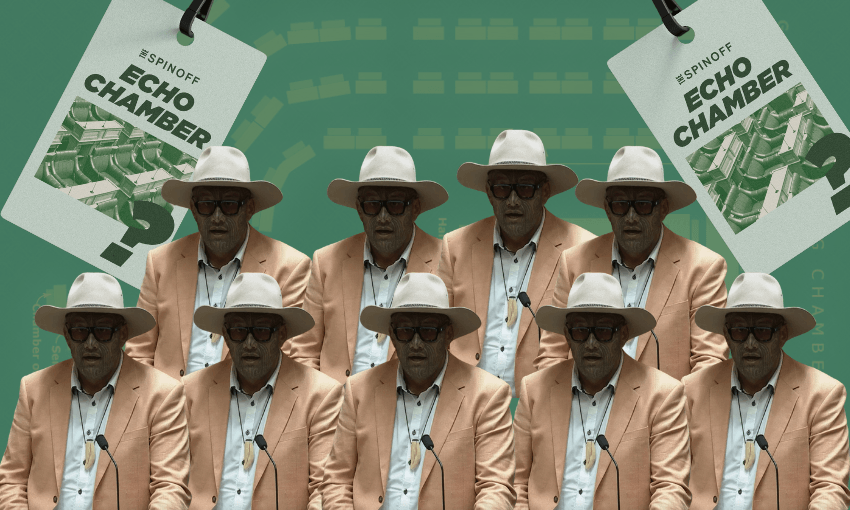Speaker Gerry Brownlee made Te Pāti Māori’s co-leader rephrase his question again, and again, and again.
Te Pāti Māori has always had a healthy disrespect for the rules of parliament. They see it as a stuffy, colonial institution rooted in traditions that exist only for the sake of tradition. By rejecting the shackles of convention, they’re free to disrupt the house with a haka and openly defy the privileges committee.
Often, that attitude is good politics. Like Winston Peters, they realise that the rules of parliament are an illusion; the only thing that really matters is votes. As long as you keep getting re-elected, you can do whatever you want. But there are other times when that dismissal of norms exposes weakness, like a sportsperson who refuses to learn the finer rules of their own game.
On Wednesday, Rawiri Waititi repeatedly tried, and failed, to ask prime minister Chris Luxon a relatively simple question about the Treaty principles bill. Speaker Gerry Brownlee required him to rephrase the question nine times, while National MPs sniggered and Labour’s biggest rules nerds (Chris Hipkins and Kieran McAnulty) tried to interject on his behalf.
Waititi’s first attempt at the question was, “Is he proud with the cultural discourse facilitated by allowing one minor party to use parliament as a platform to promote the erasure of Māori rights?” Luxon was confused. “Sorry, can you repeat the question?”
“Love to,” Waititi chirped back.
The question was far too vague and seemed to be directed at the Act Party, not the government. “There might be another way to ask that question,” Brownlee hinted. Waititi tried again, adding “… through the introduction of the Treaty principles bill?” Brownlee cut him off. “No, no, that’s the same question.”
Hipkins came to the rescue, pointing out that the addition of the words “Treaty principles bill” made it clear the question was referencing a government bill, which the prime minister has responsibility for. A chastened Brownlee admitted his mistake. “Thanks, you’ve got better ears than I have. I didn’t hear that.” With a sigh, he told Waititi, “Ask again.” Fourth time’s the charm.
Waititi asked the same question, with the same mention of the Treaty principles bill. Once again, Brownlee cut him off. “Sorry, where was the reference to a government bill in that?” A chorus of MPs from the opposition benches called back at him, “Treaty principles bill”. Ginny Andersen rocked back and forth with laughter.
Frustrated, Brownlee gave a curt instruction to Luxon: “Give it a bit of an answer; just get rid of it.” Luxon said he disagreed with the characterisation of the question, then sat back down. Waititi pivoted slightly, staying on the same topic: “Will he be voting against Act’s Treaty principles bill tomorrow?” Once again, this caught Brownlee’s ire. “For goodness sake, you can’t call it Act’s bill if it’s a government bill”.
Waititi followed up again, asking if Luxon would be voting against a member’s bill put forward by Act MP Parmjeet Parmar to end university scholarships and pathways based on race. The problem is, Parmar’s bill is a member’s bill, not a government bill. It’s a relatively arcane difference, but one that Waititi should be aware of. “I’m sure you’re about there. Just have another crack,” Brownlee said. “Sesame Street,” a National backbencher heckled.
The House grew increasingly restless as Waititi tried again. “Does he support the proposed member’s bill that will erase Māori and Pasifika pathway spaces and scholarships from all universities across Aotearoa?” National’s biggest rules nerd (Chris Bishop) interjected, pointing out that the prime minister isn’t responsible for members’ bills. Waititi made a point of order to Bishop’s point of order: “The member’s bill will be a government bill. Is he responsible for that?”
The short answer is no. Again, Waititi seemed confused about the difference between the two types of bills. “A member’s bill is a member’s bill; it’s not a government bill,” Brownlee said. “There will be another way to ask that question. I’m sorry to be difficult for you, but it’s important to get these things right.”
At long last, after stumbling at every hurdle, Waititi phrased his question in a Brownlee-approved format, asking if the prime minister supported “any bill” that would remove Māori and Pasifika scholarships and university pathways. Luxon popped up like a whac-a-mole, answered in one breath, and sat straight back down: “We’ll have to wait and see what bill comes before the House.” From his seat, McAnulty muttered, “God, he’s gutless.”
One for the record
In response to questions about the fishing industry (which is fundamentally based on killing fish), Shane Jones said, “no member of the fishing industry deliberately goes out to do damage to wildlife” – a quote that generated this remarkable series of facial expressions from Chlöe Swarbrick.





